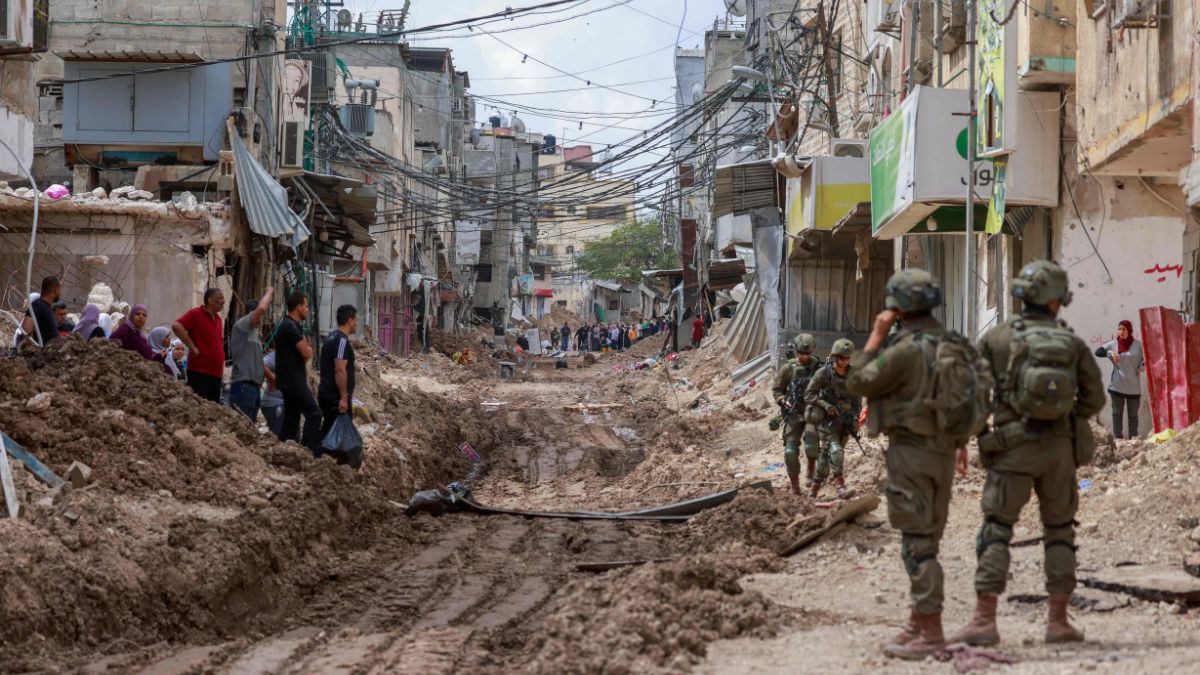Israel mobilises reservists to expand the Gaza offensive
 Israeli soldiers look on as Palestinians carry their belongings after being ordered to leave their homes during an Israeli operation in the Tulkarem camp for refugees in the northwest of the occupied West Bank on May 2, 2025 | AFP
Israeli soldiers look on as Palestinians carry their belongings after being ordered to leave their homes during an Israeli operation in the Tulkarem camp for refugees in the northwest of the occupied West Bank on May 2, 2025 | AFP
Israel is preparing to escalate its military campaign in Gaza, with local media reporting on May 3 that tens of thousands of reservists are being called up. This mobilisation coincides with rising tensions both domestically and internationally, as Prime Minister Benjamin Netanyahu sharply criticised Qatar, a key truce mediator in ongoing ceasefire negotiations.
Currently, three Israel Defence Forces (IDF) divisions are operating inside Gaza. Although the military claims the campaign is intended to pressure Hamas into agreeing to a hostage release deal, Israeli officials have signalled that further action is likely if negotiations fail. They have warned of a major new offensive in additional areas of the Gaza Strip, with the aim of degrading Hamas’s military capabilities. The IDF said pressure on Hamas would increase steadily, with the latest mobilisation forming part of a staged operational plan.
The reservists may not be sent directly to Gaza. Instead, many are expected to reinforce Israel’s northern and eastern fronts, including Lebanon, Syria, and the West Bank, enabling active-duty soldiers to be redeployed to the Strip. The IDF insists the mobilisation is driven by operational needs, amid growing public pressure to resolve the hostage crisis.
IDF Chief of Staff Lieutenant General Eyal Zamir presented a new military plan to Netanyahu and Defence Minister Yoav Gallant two days ago. The proposal reportedly includes the evacuation of Palestinian civilians from northern and central Gaza ahead of a renewed ground offensive, echoing tactics previously used in Rafah. The Israeli security cabinet is expected to approve the expansion of operations soon.
Meanwhile, Gaza’s humanitarian crisis has deepened further with Israel blocking the entry of food, medicine and fuel since early March. Many Palestinians remain displaced, living in makeshift shelters or the rubble of destroyed homes. UN agencies have warned of an impending disaster if aid access is not restored.
Despite declaring the destruction of Hamas and the return of hostages as its twin goals, Israel has yet not fully achieved either after year of war. Hamas continues to resist with a persistent insurgency, and is still believed to be holding up to 24 living hostages. Most were taken during the group’s deadly October 7, 2023 attack, which triggered the current war and has since resulted in over 50,000 Palestinian deaths.
International mediation efforts involving Qatar, Egypt and the United States have so far failed. Israel demands Hamas disarm, while Hamas insists it will not release additional hostages without a full Israeli withdrawal and an end to hostilities. Netanyahu, under pressure from his far-right coalition partners, has intensified criticism of Qatar, accusing it of siding with “Hamas barbarism”.
Netanyahu was enraged by Qatar's statements at the International Court of Justice debate, in which it termed Israel's actions in Gaza a crime. Doha’s lawyers also accused Israel of starving civilians and carrying out a "colonialist campaign”. Netanyahu’s office called on Qatar to choose a side.
Qatar has rejected the claims as inflammatory and accused Israel of using humanitarian aid as political leverage. "The State of Qatar firmly rejects the inflammatory statements issued by the Israeli Prime Minister’s Office, which fall far short of the most basic standards of political and moral responsibility," Qatar's foreign ministry spokesperson Majed Al-Ansari posted on X early today.
Meanwhile, dissent is growing within Israel’s own ranks. Thousands of reservists—many of whom have served repeated tours during the conflict—have voiced frustration over the war’s prolongation. A group of Air Force veterans and retired officers recently signed a public letter urging the government to prioritise a deal to bring the hostages home, even if it means halting the fighting. Protests in Tel Aviv and other cities continue, with demonstrators demanding that saving lives take precedence over military escalation.
Middle East